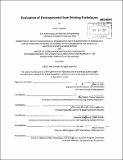Evaluation of environmental foot printing techniques
Author(s)
Conway, John J., M.B.A. Massachusetts Institute of Technology
DownloadFull printable version (5.494Mb)
Other Contributors
Leaders for Global Operations Program.
Advisor
Roy Welsch and Randolph Kirchain.
Terms of use
Metadata
Show full item recordAbstract
With a growing focus on sustainability many companies are proactively assessing their product and supply chain footprints. Cisco is a leader in the ICT (Information and Communications Technology) industry and is working to define best practices and standards. Product life cycle assessment (LCA) capability is an important competency as customers begin to request environmental impact data. The current LCA standard is to use a commercial software package, such as GaBi or SimaPro, but these tools require significant workforce resources. Often the majority of the time spent completing the assessment is focused on areas that have a minimal contribution to the overall product footprint. Industry specific estimation techniques are being developed which will allow for assessments to be completed with fewer resources. The goal of this work is to evaluate the footprint of a single rack unit router using a full life cycle assessment. Results from the life cycle assessment show that the use phase contributes over 95% of the total global warming potential (carbon footprint) given the selected assumptions. For the production phase, printed circuit boards and integrated circuits contribute over 70% of the total global warming potential. The iNEMI Eco-Impact Evaluator methodology allows for a significant reduction in analysis time to calculate a footprint and offers a valid option for creating life cycle assessments. The footprint results from this estimation technique show similar trends when compared to the results of the full life cycle assessment. The use phase is predicted to be the dominant phase. Based on a detailed comparison, the iNEMI Eco-Impact Evaluator methodology shows great promise as an option to generate product life cycle assessments with lower analysis time. This technique will allow users to integrate LCA capability into the design cycle and make valuable trades to reduce the environmental impact of future products.
Description
Thesis (M.B.A.)--Massachusetts Institute of Technology, Sloan School of Management; and, (S.M.)--Massachusetts Institute of Technology, Dept. of Aeronautics and Astronautics; in conjunction with the Leaders for Global Operations Program at MIT, 2012. Cataloged from PDF version of thesis. Includes bibliographical references (p. 69).
Date issued
2012Department
Leaders for Global Operations Program at MIT; Massachusetts Institute of Technology. Department of Aeronautics and Astronautics; Sloan School of ManagementPublisher
Massachusetts Institute of Technology
Keywords
Sloan School of Management., Aeronautics and Astronautics., Leaders for Global Operations Program.